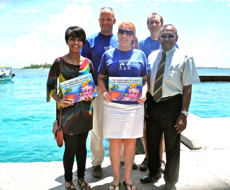UN Secretary General Ban Ki-Moon has submitted a report documenting alleged war crimes in the closing days of the Sri Lankan Civil War to the UN Human Rights Council.
The report accuses the Sri Lankan military of killing tens of thousands of civilians through shelling in the closing days of its war with Tamil separatists, and increases the likelihood that the Human Rights Council may be called on to vote for a full international, independent investigation.
Sri Lanka has meanwhile rejected the report’s findings and stated that it opposes an outside investigation. Instead, the government has appointed its own ‘Learnt and Reconciliation Commission’ (LLRC), which is expected to publish its findings on November 15.
Central to the UN’s case is graphic footage of the execution of bound and gagged prisoners, which the UN’s Special Rapporteur on Extrajudicial, Summary or Arbitrary Executions, Christof Heyns, described as reflecting “crimes of the highest order — definitive war crimes.”
Heyns analysed the video in consultation with a forensic pathologist, firearms expert and two forensic video analysts, and concluded that the footage was authentic, however the Sri Lankan government has maintained that the video is fake.
It has also stated that civilian casualties were unavoidable during the final offensive, due to the Tamil Tigers’ use of 300,000 people as human shields.
As an outspoken member of the UN Human Rights Council and a vocal proponent of intervention during the Libyan uprising – and also Sri Lanka’s neighbour – the situation is likely to challenge the Maldives diplomatically.
Yesterday, as the international community was ratcheting up the pressure on Sri Lanka, President Mohamed Nasheed called for an “amicable solution”.
“As long as we argue about Sri Lanka, the government is increasingly marginalised and we are losing the government and the country outside the fold of the international community,” Nasheed warned.
“We must understand that a number of very, very bad things happened but we must be able to move forward,” he said.
Current Maldivian Foreign Minister Ahmed Naseem has previously described the UN report as “singularly counterproductive”, while during a recent interview with Minivan News, former Foreign Minister Dr Ahmed Shaheed said he felt the government’s position on Sri Lanka “has been misunderstood”, particularly its comparison with the government’s stance on Libya.
“But I think Naseem’s comments and the government’s position on Sri Lanka have been misunderstood. The Libyan situation is different from the current situation in Sri Lanka. Libya is ongoing – things are happening today on the ground, and we need to try to prevent further abuses tomorrow,” he said at the time.
“In Sri Lanka’s case these are post-conflict issues. What we say is that the most important thing in a post-conflict situation is to find a way forward and not live in the past. This does not mean we are condoning abuses, or saying such things are fine. But Sri Lanka needs to find common ground with the UN Human Rights Council in which both parties can move forward. The government of Sri Lanka needs to be able to enter into dialogue with the international community to achieve speedier reconciliation.
“You can’t have reconciliation and long-lasting peace unless you respect human rights and set up mechanisms to do so. But we should steer clear of politicisation, or the divisions that have kept the flame of terrorism alive in Sri Lanka for so long. We are saying let Sri Lanka find a way forward and achieve reconciliation – we are not saying we don’t care about the past,” Dr Shaheed said.
China and Pakistan have also expressed support for Sri Lanka.
Meanwhile Mahinda Samarasinghe, Sri Lankan President Rajapaksa’s special envoy on human rights, has called for the international community to wait for the findings of Sri Lanka’s own commission in November.
“It is disconcerting to note the haste with which some have sought to usurp the government of Sri Lanka’s prerogative in deciding its domestic process,” Samarasinghe has previously told the Council.
“We firmly believe that our home-grown process is capable of addressing the nuances of our unique situation.”
However several international human rights organisations, including International Crisis Group (ICG), Human Rights Watch (HRW), and Amnesty International (AI) have refused to appear before the LLRC claiming it fails to meet minimum international standards, noting that its members were appointed by the government, it had no mandate to investigate war crimes in the closing days of the conflict, and lacked any mechanism to protect witnesses.
“The LLRC’s mandate, its composition, its procedures, and the human rights environment in which it is operating all conspire to make a safe and satisfactory outcome for victims of human rights violations and their families extremely unlikely,” said Amnesty International’s Deputy Director for the Asia-Pacific region, Madhu Malhotra, in October 2010.
“Amnesty International is particularly concerned about the lack of any provisions for witness protection and the fact that former officials who have publicly defended the Sri Lankan government against allegations of war crimes serve on the commission.”
Warning: some readers may find the following footage disturbing




